Family Caregiving Tips For Happier Holidays
If you're reading this blog chances are you're a professional or family caregiver. You know how difficult holidays can be. They impact both the caregiver and the one needing care differently but each usually feel added stress. Planning ways to ease the stress is as important as planning a holiday meal or gifts to exchange. This year, as 12% of Washington families prepare to celebrate with someone who has dementia or a serious illness, helping organizations are gearing up to guide families in ways to make the holidays easier and more inclusive for loved ones in their care. 22 December, 2015


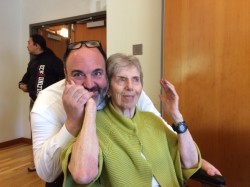 Andrew Cohen, of
Andrew Cohen, of 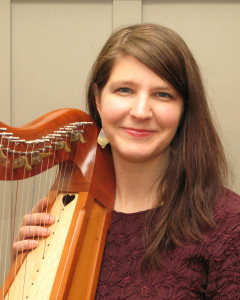 "My work as a therapeutic harpist is a service and not a performance. I don't expect any kind of recognition," multi-talented Seattle musician Monica Schley explained when she sat down to discuss her experience as a Certified Clinical Musician. Most of Schley's musical roles, such as her chamber-pop band, The Daphnes, or role in the experimental pop opera, "Now I'm Fine," involve performance and entertainment but through her service as a therapeutic musician, she says, she's found "soul purpose" and improved aspects of her musicianship. Schley began her journey with the harp at the age of 14. Since then she's gained mastery of her instrument and acquired a wide repertoire of music which will soon debut on her first full length album "
"My work as a therapeutic harpist is a service and not a performance. I don't expect any kind of recognition," multi-talented Seattle musician Monica Schley explained when she sat down to discuss her experience as a Certified Clinical Musician. Most of Schley's musical roles, such as her chamber-pop band, The Daphnes, or role in the experimental pop opera, "Now I'm Fine," involve performance and entertainment but through her service as a therapeutic musician, she says, she's found "soul purpose" and improved aspects of her musicianship. Schley began her journey with the harp at the age of 14. Since then she's gained mastery of her instrument and acquired a wide repertoire of music which will soon debut on her first full length album "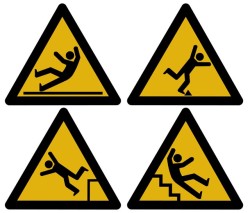 ng cause of injury-related hospitalization for older adults. If you're 65 years of age or over you have a 1 in 3 chance of falling. More than 12,000 people in Washington are hospitalized for a fall each year causing skilled nursing stays, loss of independence and fatalities at disturbing rates. So, starting now, September 23rd, National Falls Prevention Awareness Day, please take a minute to consider the information offered to help you and your loved ones stay safe from falls. Falls aren't a normal part of aging. For the most part they're preventable which means that your awareness and proactive decisions make a difference. The risk factors that cause falls are known and can be addressed in three steps:
ng cause of injury-related hospitalization for older adults. If you're 65 years of age or over you have a 1 in 3 chance of falling. More than 12,000 people in Washington are hospitalized for a fall each year causing skilled nursing stays, loss of independence and fatalities at disturbing rates. So, starting now, September 23rd, National Falls Prevention Awareness Day, please take a minute to consider the information offered to help you and your loved ones stay safe from falls. Falls aren't a normal part of aging. For the most part they're preventable which means that your awareness and proactive decisions make a difference. The risk factors that cause falls are known and can be addressed in three steps: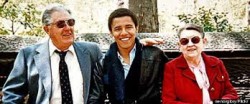 Those are the words of President Barack Obama in his
Those are the words of President Barack Obama in his  Do you run? Walk? Bicycle? If you do, you're part of the reason that Seattle consistently ranks in the top ten fittest cities. If you need some motivation to join the crowd the National Institute on Aging has launched an annual program called Go 4 Life. Go 4 Life promotes physical activity to improve quality of life for older adults. This isn't just about urging couch potatoes to move this is a drive to bring exercise to everyone whether you have arthritis, live with dementia, suffer depression, experience low vision, or just feel too busy. Tap into the movement and improve your health--- it's Go 4 Life month!
Do you run? Walk? Bicycle? If you do, you're part of the reason that Seattle consistently ranks in the top ten fittest cities. If you need some motivation to join the crowd the National Institute on Aging has launched an annual program called Go 4 Life. Go 4 Life promotes physical activity to improve quality of life for older adults. This isn't just about urging couch potatoes to move this is a drive to bring exercise to everyone whether you have arthritis, live with dementia, suffer depression, experience low vision, or just feel too busy. Tap into the movement and improve your health--- it's Go 4 Life month!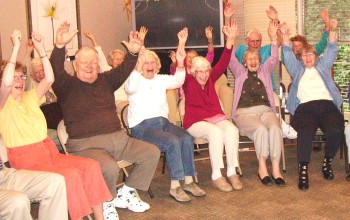 Laughing at Ida Culver[/caption] You may have noticed, on
Laughing at Ida Culver[/caption] You may have noticed, on 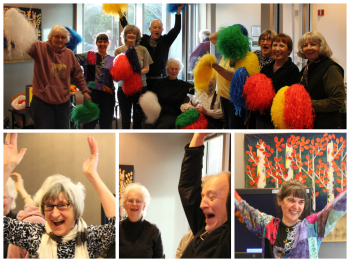 Verde and class at TheHub[/caption] Laughter Yoga is fun and playful yet, as Teresa Verde, a pioneer, of Laughter Yoga in Seattle and Certified Laughter teacher since 2001, explains, "This is a vigorous exercise. It is basically a "laughter workout." Is Laughter Yoga good for elders? I asked. Yes. Laughter increases energy by oxygenating the system and triggering the "happiness factor." Keys to a positive experience? Being open to new things, having some level of stamina, and participating in a group that embraces the idea. Caregivers? Laughter Yoga is also good for you. It relieves stress, can be practiced in the moment, and promotes wellness.
Verde and class at TheHub[/caption] Laughter Yoga is fun and playful yet, as Teresa Verde, a pioneer, of Laughter Yoga in Seattle and Certified Laughter teacher since 2001, explains, "This is a vigorous exercise. It is basically a "laughter workout." Is Laughter Yoga good for elders? I asked. Yes. Laughter increases energy by oxygenating the system and triggering the "happiness factor." Keys to a positive experience? Being open to new things, having some level of stamina, and participating in a group that embraces the idea. Caregivers? Laughter Yoga is also good for you. It relieves stress, can be practiced in the moment, and promotes wellness.